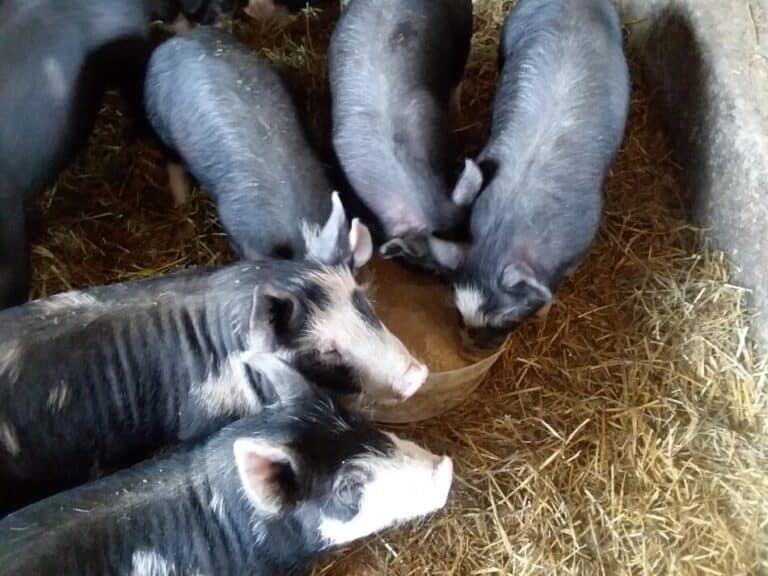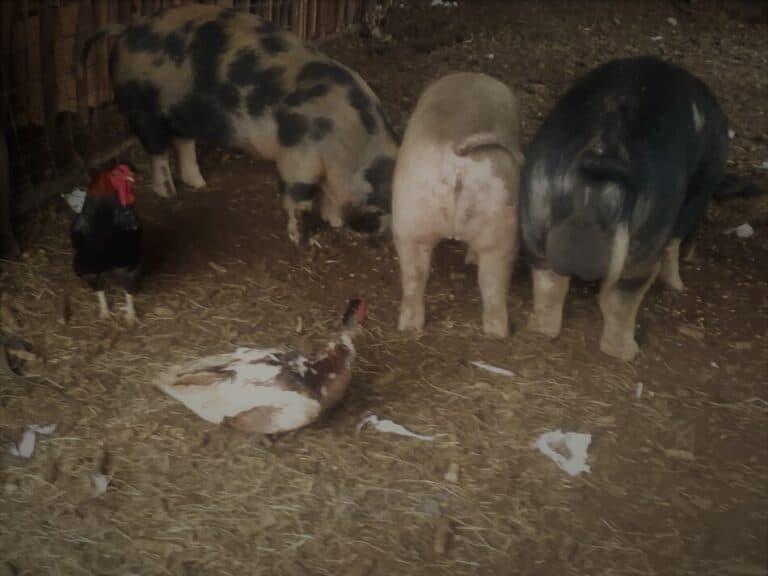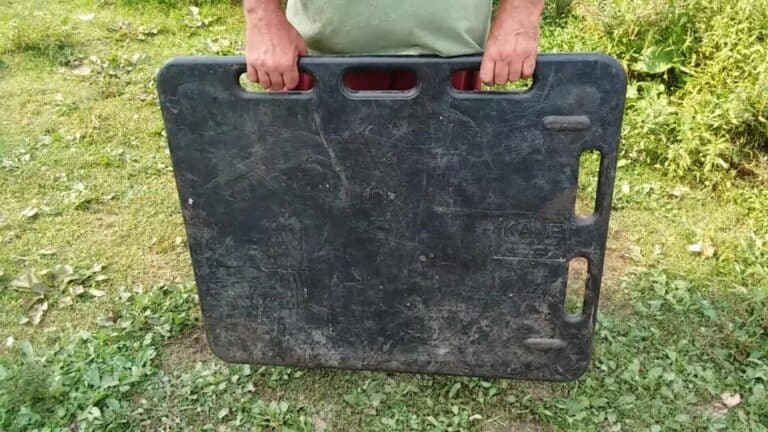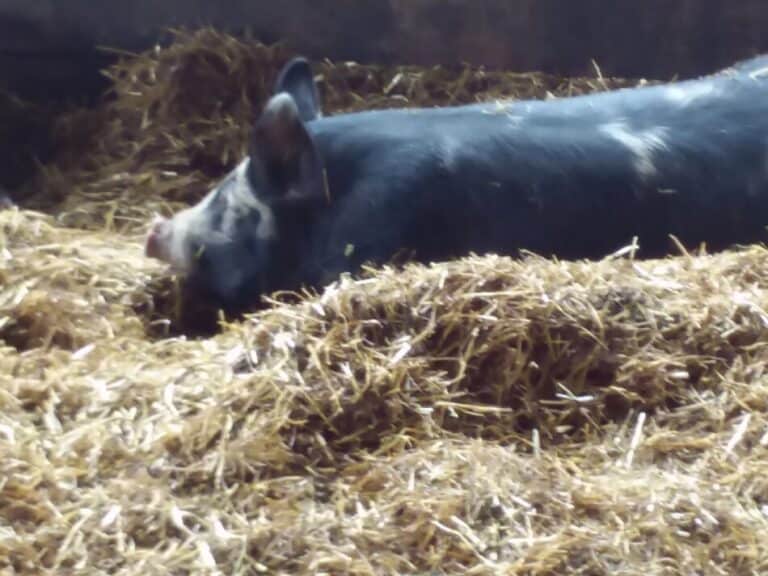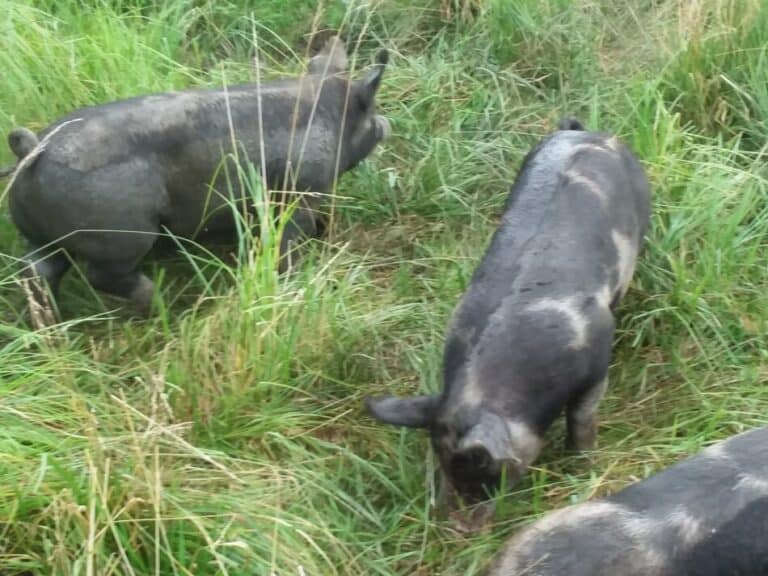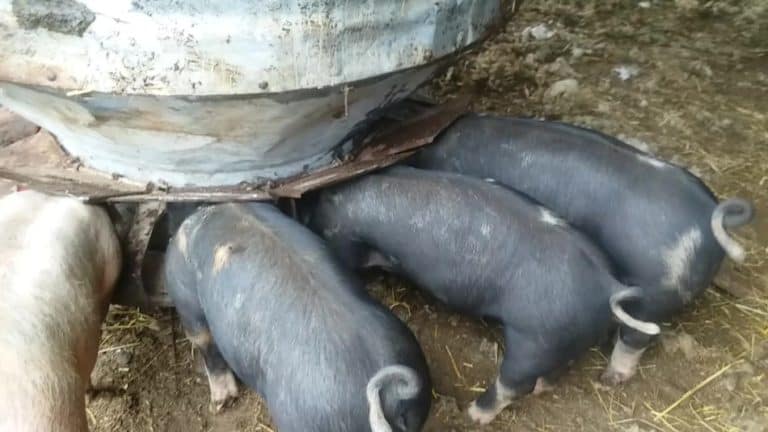Are Pigs A Good Fit For Your Farm? 6 Questions To Think About
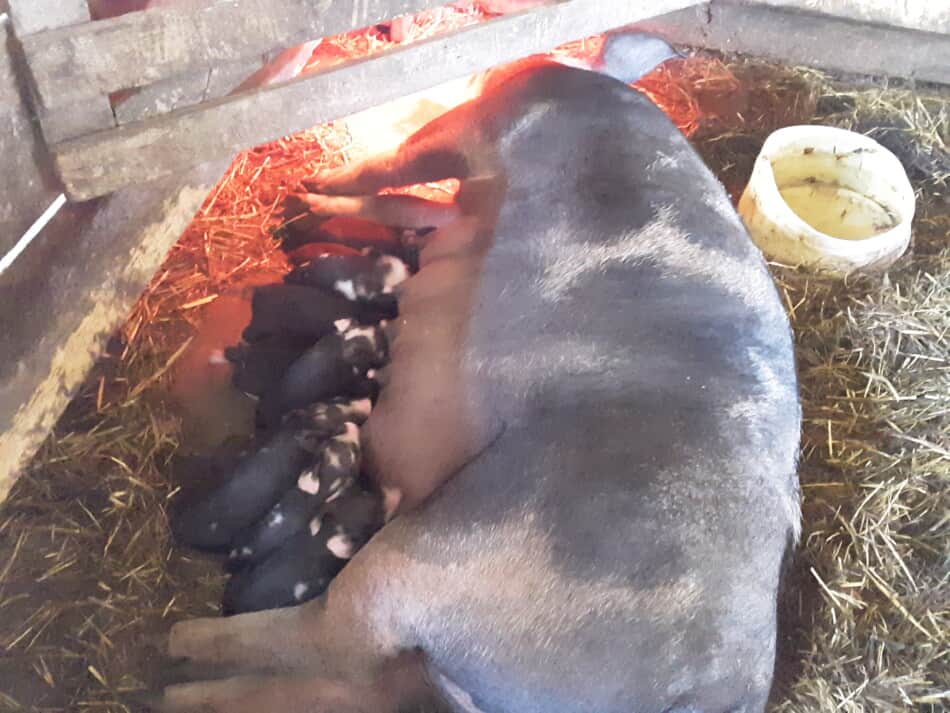
Before you get started with pigs, ask yourself “are pigs a good fit for me and my farm?” Here are some of the things you need to consider before jumping into pigs.
Do you enjoy spending time raising pigs?
We’ll start with what I consider to be the obvious question: do you like pigs? Do you enjoy spending time with pigs? If you do not enjoy pigs being pigs, consider raising something else, instead.
Pigs are a great animal to raise, quick, pretty easy and you get loads of wonderful meat from each one!
But…none of this will make up for you hating pigs, pigs are not for everyone.
If you do not enjoy all of the innate pigness that comes with each and every pig, do yourself and the pigs a favor and choose to spend you time and energy on something you are happier with.
If you are a person who enjoys pigs and their antics, read on, pigs might just be the right animal for you and your farm.
Is Raising Pigs For Meat Worth It? is an article I wrote going over the whole budget for raising your own pork, if you are thinking of pigs on a bigger scale, the article still will help.
Is there are high demand for pigs in your area?
Here’s the big one, is there a high demand for pigs in your area? Without demand, there is not much of a reason to raise pigs!
Look around your area and see what people are selling and asking for, in regards to pigs. Are there tons of folks selling piglets or are there tons of folks asking about piglets?
What about processors? How close are you to a processor? You and anyone who buys pigs from you, will have to get those pigs to a processor, especially if you want nicely packaged retail cuts in the freezer.
Of course, you can raise pigs even in high competition areas, but this usually equals lower prices for the farmer. Low demand areas have a similar problem, you’ll do the work but have a hard time getting paid.
Where do you plan to sell your pigs?
Sure, you can raise pigs, but where will you sell them? This is a vital question for anyone who is not raising pigs as a hobby, but as a business.
Do you have a local, or close enough that you are willing to drive to, auction where you could sell your pigs?
Do the local processors or restaurants buy directly from farmers?
We sell all of our pigs through the local auctions, usually as feeder pigs. We do not currently do any direct sales, but there are tons of folks that do and it makes for a successful pig business.
Online pork sales are increasingly popular
I must admit, with a decent internet connection and the willingness to ship, you can get past the variabilities of your local market by selling online.
Online meat sales are becoming more common, which opens up a huge area of potential customers to you and your pig business.
You’ll need to have the marketing in place to get in touch with these customers and the facilities to hold quite a bit of frozen, ready to sell meat and the process to take, fill and ship orders.
Can you get the supplies you need for your pigs?
While pigs do need a few other things, like dewormer or replacement parts for the waterer, the main supply you’ll be buying is feed.
Pigs need feed and the bigger they get the more feed they need.
Where are you getting your feed and is this source reliable? You can ship in feeders and waterers or build your own, but feed is a different story, it needs to be local.
Consider looking around for a feed mill. If you can find a mill within driving distance, see what their prices are, you’ll be pleasantly surprised. By getting our feed at a feed mill, we pay just over half price.
We go to a feed mill that is 45 minutes away from here, rather than getting branded 50 pound bags of pig feed at the local farm store. The price difference is stunning and well worth the drive.
We make the trip for other reasons, it’s the home of our main livestock auction, so we can fit getting feed in with another trip.
If we weren’t going anyway, it would make more sense to pay the delivery fee and save the gas.
Pounds Of Feed Needed To Raise Pigs will show you how to figure up the amount of feed you should plan to buy.
Do you have the facilities pigs require?
No matter how you choose to raise your pigs, you’ll need some where to put them that is good for the pigs and good for you. This could be a building with a roomy pen and plenty of bedding or outside, on pasture or in the woods.
Pigs under roof need plenty of space and bedding
For pigs raised under roof, you’ll need sturdy pen sides, a place to put the waterer that can handle a bit of a mess, a place to put the feeder that is easy to fill and plenty of bedding to keep the pigs busy and give them opportunity to exercise.
You’ll also need a few hog hurdles, to move the pigs and a few spare gates never hurt, either!
How Much Space Do Pigs Need? goes over pen lay out and Pigs On 5 Acres looks into pasture layout plans.
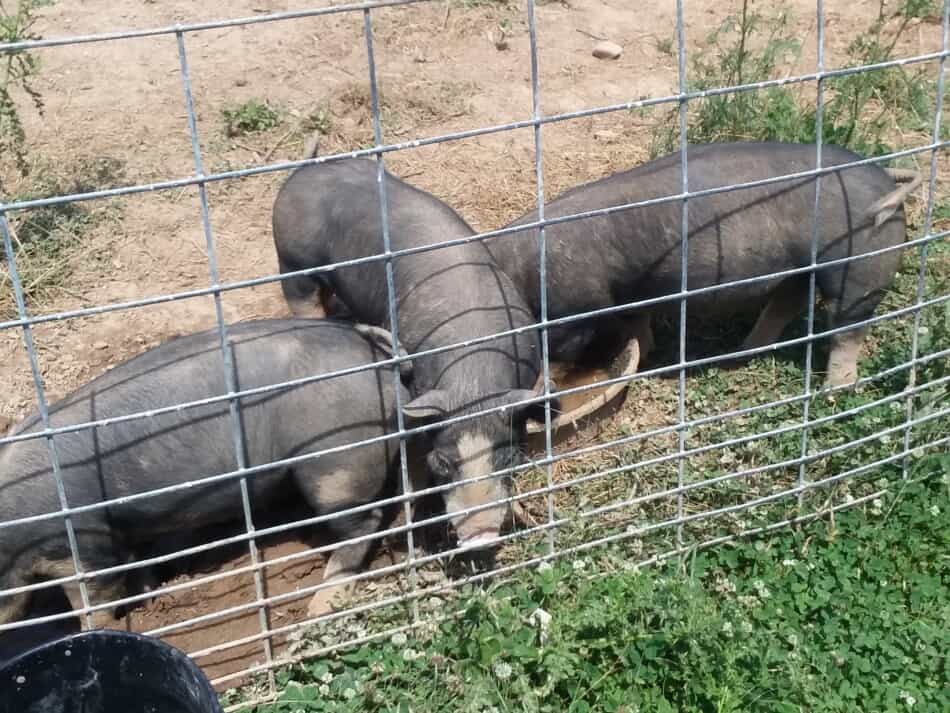
Outdoor pigs need fence and shelter, in addition to everything an under roof pig needs
If you are raising pigs outdoors, remember that pigs still need all of the things indoor pigs need, in addition to a fence and a shelter of some sort.
Shade or shelter is critical for your pigs in the summer. Shade could be shade cloth, trees or a movable shelter, like a wagon or a tarp over a hooped up cattle panel.
You are not so much worried about rain, as long as pigs aren’t in standing water, they are fine. It’s the sun and the heat that will make your porkers uncomfortable.
For fence, most folks would be using an electric fence charger with a strand or two of wire. Pigs are very respectful of an electric fence and easy to keep in it, once they are trained.
There are some great fencers available, plug in, battery and/or solar, depending upon which suits your needs.
The final thing folks may not think of with raising pigs outdoors is your farm’s soil. Some soil types can handle pigs well, other types will not.
Pigs will root, just plan on it, but there is more to consider here than just rooting.
The part folks forget about it that pigs are heavy and can compact the soil and really mess up an area if they are left in one spot too long.
Sandier soils handle pig pressure better than clay type soils and good drainage for your pig pasture is a must.
You can make up for less than ideal soil conditions by moving the pigs frequently, before they do too much renovation to an area or by keeping the pigs under roof in a well bedded pen and use the pasture for another animal, like sheep.
Here’s a nice overview article from Penn State Extension, Raising Small Groups of Pigs, that goes over expected meat yields, space needed and potential illnesses.
What are you going to do with the manure?
You know your pigs, like all animals, will be producing manure. What is your plan to use it? Notice, I wrote “use it” not deal with it or get rid of it! Manure is a valuable resource that is all too often squandered.
Have a plan to handle the manure your pigs will produce so you keep all of the nutrients intact. If you smell manure, you are loosing some of the value of this resource.
An easy way to sequester the nutrients in manure (keep the smell under control) is with bedding, like straw or wood shavings. Just keep adding bedding, as needed. Smelling manure=needs more bedding.
Once you move pigs out of the pen, clean out the pen and pile the manured bedding in an out of the way area and allow it to compost down.
You might need to turn the pile to keep the composting process going or add water, if it stalls out. When you can poke around in the pile and you only smell dirt, not poo, it’s done and ready for your garden.
Breeding pigs require more planning and space
If you are planning on breeding pigs, you’ll need to think of a workable year round plan and set up.
You’ll want a way to keep the adults separate from each other, a special area for farrowing, a weaned pig area and an area for growing replacement stock.
All of these groups require feeding, waterers, gates, plenty of bedding, etc.
Not to mention, the added complication of breeding the pigs, meaning planning out your year and doing your best to stick to that schedule.
Know your reason for breeding pigs
Whether breeding pigs is a good plan for your area or not, depends on demand. If folks in your area want feeder pigs, breeding pigs to supply that demand could be a nice money maker for you.
If you are having trouble sourcing your piglets, breeding your own might just be the answer. Raise piglets for yourself, then sell to other folks who also want to raise their own pork.
If you have a cracking pork business and want to get more involved by raising your own piglets, be sure to do the math so you’ll keep or increase your margin rather than take on more work for less overall return.
Know your profit margin when raising and breeding pigs
Feed and space needed are the biggies here. The boar and sows eat all year and it’s easy to forget to include their expenses in when you are figuring up a budget for selling feeder pigs or market hogs.
I can see the check from the pigs I sold and forget all about taking out all of the costs to get the pigs to saleable weight.
Be sure to do the math to make sure you are likely to be running the business you think you are.
If pigs are plentiful in your area, or no one is interested in buying them, rethink your plan.
I see a noticeable amount of people selling their small breeding herd of pigs, usually of an unusual breed, when they find out there is little demand for the pigs they are raising.
Be sure to figure out the income part, before you get pigs.
